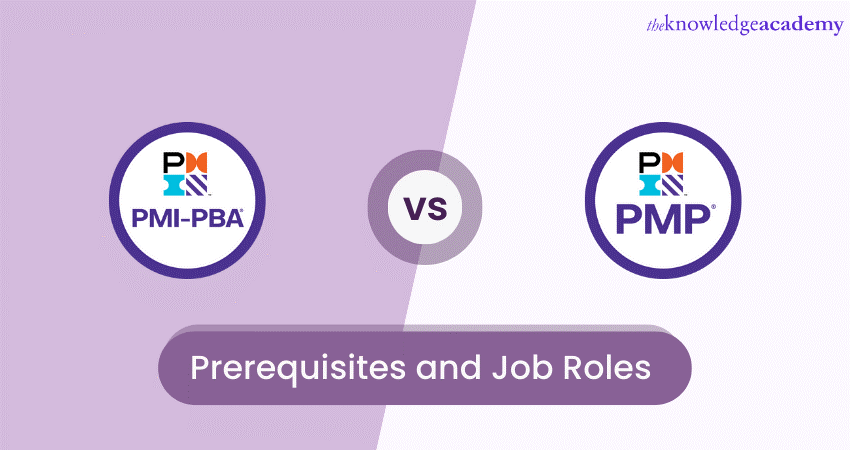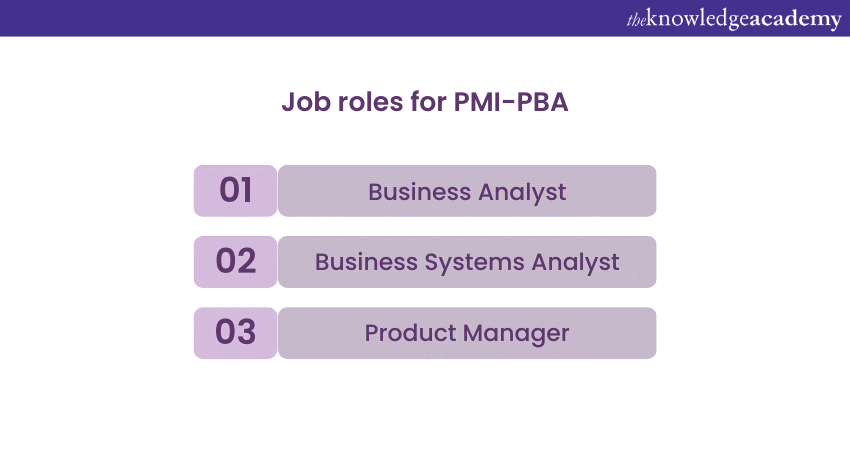We may not have the course you’re looking for. If you enquire or give us a call on +44 1344 203 999 and speak to our training experts, we may still be able to help with your training requirements.
Training Outcomes Within Your Budget!
We ensure quality, budget-alignment, and timely delivery by our expert instructors.

In the world of Project Management, certifications play a crucial role in demonstrating an individual's expertise and credibility. Two certifications that hold significant value in the industry are Project Management Institute-Professional in Business Analysis (PMI-PBA) and Project Management Professional (PMP). The PMI PBA vs PMP debate has been prevalent for a while now, which can be settled with a detailed comparison of various aspects of both.
While both certifications offer valuable insights into Project Management, distinct prerequisites, and job roles are associated with each. This blog will highlight the differences between PMI-PBA and PMP based on the prerequisites and job roles.
Table of Contents
1) What is PMI-PBA?
2) What is PMP?
3) Prerequisites for PMI-PBA and PMP
4) Job roles for PMI-PBA
5) Job roles for PMP
6) Conclusion
What is PMI-PBA?
PMI-PBA stands for Project Management Institute-Professional in Business Analysis. The certification is provided by a globally recognised organisation in Project Management - Project Management Institute (PMI).
PMI-PBA certification focuses specifically on the domain of business analysis within the context of Project Management. Business analysis plays a crucial role in understanding and addressing the needs of stakeholders, identifying requirements, and ensuring project success.
Professionals who obtain PMI-PBA certification demonstrate their expertise and competency in the field of business analysis, showcasing their ability to effectively contribute to project outcomes by bridging the gap between business objectives and project deliverables.
Advance your Project Management career with our PMI Professional In Business Analysis PMI PBA® Course now!
What is PMP?
PMP stands for Project Management Professional. It is a renowned certification offered by PMI, a globally acknowledged organisation in the field of Project Management. PMP certification is designed to validate and showcase the competence of professionals in leading and managing projects.
It demonstrates their ability to apply Project Management best practices and deliver successful outcomes in various industries and sectors. PMP certification covers a broad spectrum of Project Management knowledge areas, including:
a) Project Integration
b) Scope management
d) Cost management
e) Quality management
f) Human resource management
g) Communication management
h) Risk management
i) Stakeholder management
Furthermore, PMP certification provides professionals with a valuable network of peers and resources through PMI's global community of Project Management practitioners. This community offers opportunities for knowledge sharing, professional growth, and ongoing learning.

Prerequisites for PMI-PBA and PMP
To pursue PMI-PBA and PMP certification, candidates need to meet certain prerequisites. These prerequisites ensure that candidates have the necessary educational background, professional experience, and training to excel in business analysis and Project Management, respectively.
|
Prerequisites |
PMI-PBA |
PMP |
|
Educational requirements |
Candidates must hold a secondary degree, which can be a high school diploma, associate's degree, or any global equivalent. |
Candidates must possess a secondary degree, which can be a high school diploma, associate's degree, or any global equivalent. Candidates can fulfil the education requirement by holding a four-year degree (bachelor's degree or global equivalent) as well. |
|
Professional experience |
PMI-PBA certification emphasises the importance of practical knowledge and hands-on experience in real-world projects. Candidates with a secondary degree must have at least 7,500 hours of professional experience in business analysis in the last eight years and at least 2,000 hours of experience working on project teams. Candidates with a higher-level degree (bachelor’s degree or global equivalent) need a minimum of 4,500 hours of business analysis experience within the last eight years, along with at least 2,000 hours of project team experience. |
Candidates must have relevant professional experience in Project Management. Candidates with a secondary degree must have a minimum of 5 years (60 months) of professional Project Management experience via leading and directing projects, with a minimum of 7,500 hours spent in project leadership roles. The professional experience requirement is slightly different for candidates with a higher-level degree. They need a minimum of 3 years (36 months) of professional Project Management experience, with at least 4,500 hours spent in project leadership roles. |
|
Exam |
The PMI-PBA exam assesses their understanding of business analysis principles, practices, and techniques. It covers topics including requirements management, stakeholder engagement, elicitation and analysis, solution assessment and validation, and more. |
The PMP exam evaluates their understanding of Project Management principles, processes, and best practices. It covers topics including project initiation, planning, execution, monitoring, controlling, and closing. |
Job roles for PMI-PBA

Business Analyst
PMI-PBA certification prepares professionals for the role of a business analyst, where they bridge the gap between business objectives and project deliverables. They collaborate with stakeholders to identify business needs, elicit requirements, analyse requirements, and ensure effective communication and documentation throughout the project lifecycle. Business Analysts earn an average of £49,825 annually.
Business Systems Analyst
Business Systems Analysts focus on understanding the organisation's business processes, systems, and technology requirements. They assess existing systems, identify areas for improvement, and work with project teams to design and implement effective solutions that align with business goals. Business Systems Analysts earn an average of £36,270 annually.
Product Manager
PMI-PBA certification equips professionals with skills to analyse market needs, gather user requirements, and define product features. Product managers ensure that product development aligns with business objectives and user expectations, driving the success of new products or enhancements. Product Managers earn an average of £62,458 annually.
Acquire the skills required to progress your career in the field of Project Management with our PMP® Certification Training Course now!
Job roles for PMP
PMP-certified professionals are in high demand for various high-paying job opportunities. They are provided with the skills required to excel in various job roles that require strong Project Management expertise. Some of the key job roles for PMP-certified professionals include:
Project Manager
PMP-certified professionals are well-suited for the role of a project manager. They possess the skills and competencies to lead and manage projects of varying sizes and complexities. Project managers carry the responsibility for planning, organising, and executing projects while ensuring they meet the defined goals, timelines, and budgetary constraints. Project Managers earn an average of £51,764 annually.
Portfolio Manager
PMP-certified professionals can excel as portfolio managers who manage an organisation's collection of projects and programs. Portfolio managers align projects and programs with the organisation's strategic objectives, prioritise resource allocation, and make informed decisions to maximise the value and success of the portfolio. Portfolio Managers earn an average of £80,049 annually.
Project Analyst
PMP certification equips professionals to work as project analysts, analysing project data, tracking performance metrics, and providing valuable insights to project managers. They assist in project planning, risk assessment, and resource allocation, helping ensure project success through data-driven decision-making. Project Analysts earn an average of £32,442 annually.
Conclusion
Deciding between PMI PBA and PMP certifications for your Project Management career can be a crucial choice as both certifications offer distinct advantages and cater to different areas of specialisation. We hope you enjoyed reading this PMI PBA vs PMP blog and that it helped you learn about the prerequisites and job roles associated with both certifications.
Elevate your Project Management skills by signing up for our Project Management Courses today!
Frequently Asked Questions
Upcoming Project Management Resources Batches & Dates
Date
 PMP® Certification Training Course
PMP® Certification Training Course
Mon 13th Jan 2025
Mon 20th Jan 2025
Mon 27th Jan 2025
Mon 3rd Feb 2025
Mon 10th Feb 2025
Mon 17th Feb 2025
Mon 24th Feb 2025
Mon 3rd Mar 2025
Mon 10th Mar 2025
Mon 17th Mar 2025
Mon 24th Mar 2025
Mon 31st Mar 2025
Mon 7th Apr 2025
Mon 14th Apr 2025
Tue 22nd Apr 2025
Mon 28th Apr 2025
Tue 6th May 2025
Mon 12th May 2025
Mon 19th May 2025
Tue 27th May 2025
Mon 2nd Jun 2025
Mon 9th Jun 2025
Mon 16th Jun 2025
Mon 23rd Jun 2025
Mon 30th Jun 2025
Mon 7th Jul 2025
Mon 14th Jul 2025
Mon 21st Jul 2025
Mon 28th Jul 2025
Mon 4th Aug 2025
Mon 11th Aug 2025
Mon 18th Aug 2025
Tue 26th Aug 2025
Mon 1st Sep 2025
Mon 8th Sep 2025
Mon 15th Sep 2025
Mon 22nd Sep 2025
Mon 29th Sep 2025
Mon 6th Oct 2025
Mon 13th Oct 2025
Mon 20th Oct 2025
Mon 27th Oct 2025
Mon 3rd Nov 2025
Mon 10th Nov 2025
Mon 17th Nov 2025
Mon 24th Nov 2025
Mon 1st Dec 2025
Mon 8th Dec 2025
Mon 15th Dec 2025







 Top Rated Course
Top Rated Course


 If you wish to make any changes to your course, please
If you wish to make any changes to your course, please


